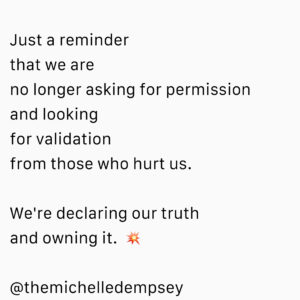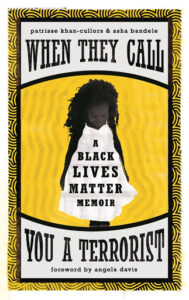Friend:
So you’re not in contact with your daughter anymore?
Family Member:
No, she’s just too much. Always some issue with her. Always making everything harder than it has to be.
Friend:
Wow. What happened exactly? Did she hurt someone? Lie? Betray you?
Family Member:
No, not really. It’s more like… she always has needs and limits and feelings that are too much and make no sense. So sensitive. Demanding. Needy. Always demanding conversation. It’s exhausting.
Friend:
That doesn’t sound like a crime. Did she ask to talk about something hard?
Family Member:
Yeah, but she turns everything into a problem. Like, she’ll say something felt hurtful, or ask someone to stop doing something—and suddenly, it’s a whole thing. She speaks problems into existence. If she’s upset, that’s the problem. Not what caused it.
Friend:
So she brings up something painful and you say she’s just trying to cause drama?
Family Member:
Exactly. We always told her: stop manufacturing chaos. If you’re hurting, you probably imagined it, earned it, or brought it on yourself.
Friend:
That sounds brutal. What happens when she does try to talk about it?
Family Member:
She gets overwhelmed. Emotional. Then she cries and it’s like, see? You can’t even talk to her. She’s unstable.
Friend:
Did you ever try family therapy?
Family Member:
Yes, once. She completely fell apart in the session. Couldn’t handle us calmly telling the therapist how hard she is. The therapist saw right through her.
Friend:
Or maybe she broke down because the room was against her and you used that as proof?
Family Member:
Whatever. She just needs everything to be her way. We can’t do that.
Friend:
So what’s the worst thing she actually did?
Family Member:
She refused to keep showing up -opted out until we had more useless conversations. She always said she’d come to the table if people would be kind. But she made herself the outsider. Ask anyone—she sucks.
Friend:
But if nobody can name what she actually did—not how she felt, or how you felt about her, but what she really did—then what was she punished for?
Family Member:
For being impossible. Creating Tension to get attention.
Friend:
Hmmm
14 Years Later
Friend:
Wait… so you don’t talk to your mom anymore?
Son:
Nah. She’s impossible. Always on my case, trying to control everything.
Friend:
That sucks. But like—what did she do? Was she abusive? Did she lie to you or betray you? Does she slave you areound with endless and unreasonable chores?
Son:
No. She just… always had these expectations….demands. And like tried to be my boss. Always correcting me. She wanted me to be perfect.
Friend:
Okay… but was she unfair? Like punishing you for stuff that wasn’t real? Was she constantly grounding you or taking your phone for no reason?
Son:
No, not really. I think I got grounded maybe once. She barely ever took my phone.
Friend:
So you weren’t in trouble all the time?
Son:
No, not really. She’d just get mad when I didn’t follow through or when I ignored her.
Friend:
So… she had rules?
Son:
Yeah, but she wanted consistency. Like, if I did something well for three weeks, and then I would drop the ball and she would correct or redirect me. Like the three weeks did not even count.
Friend:
Oh, she wanted you to hold a good standard and get back to doing the good job. That doesn’t sound crazy. That sounds like accountability… parenting?
Son:
She just wouldn’t let me do whatever I wanted. She’d say no to stuff sometimes. She expected respect.
Friend:
Did you guys ever try family therapy?
Son:
Yeah, but I went thinking it’d be my chance to explain my side, and maybe get the therapist to see how hard she is. I don’t think she went in expecting that.
Friend:
So… you weren’t there to try to heal things?
Son:
Not really. And she got upset in the session, started crying, and then it was like—“see? She’s so emotional, you can’t even talk to her.”
Friend:
So her emotional reaction to being overwhelmed was used as proof that she’s the problem?
Son:
I mean… yeah.
Friend:
And the worst thing she did was… not agree immediately to let you drive across the country at 16 without a plan?
Son:
She said I could if I had check-ins and stayed with people we know. But it felt like she didn’t trust me.
Friend:
So she wanted to keep you safe and be part of the planning, and that made her the enemy?
Son:
I guess. But still… she sucks
Narrator:
This is the anatomy of a smear campaign.
A person becomes “too much” only after they become unwilling to be mistreated.
They say, “She’s hard to deal with.”
But what did she do?
Ask again.
From every angle.
Ask louder.
Ask in front of the people who repeat the story.
Ask the ones who believe it.
What did she do?
What did she do?
And if no one can name it,
then maybe—
just maybe—
she didn’t do anything at all.
Maybe she just stopped agreeing to be the scapegoat.
Below are just a few of the books that have been especially informative and healing for me as I navigate my journey of recovery and self-understanding:
- The Body Keeps the Score by Bessel van der Kolk – for understanding the deep, lasting impact of trauma and emotional invalidation.
- Will I Ever Be Good Enough? by Dr. Karyl McBride – essential reading for daughters of narcissistic mothers.
- Adult Children of Emotionally Immature Parents by Lindsay C. Gibson – for recognizing and healing from patterns rooted in emotionally unavailable or self-absorbed parenting.



